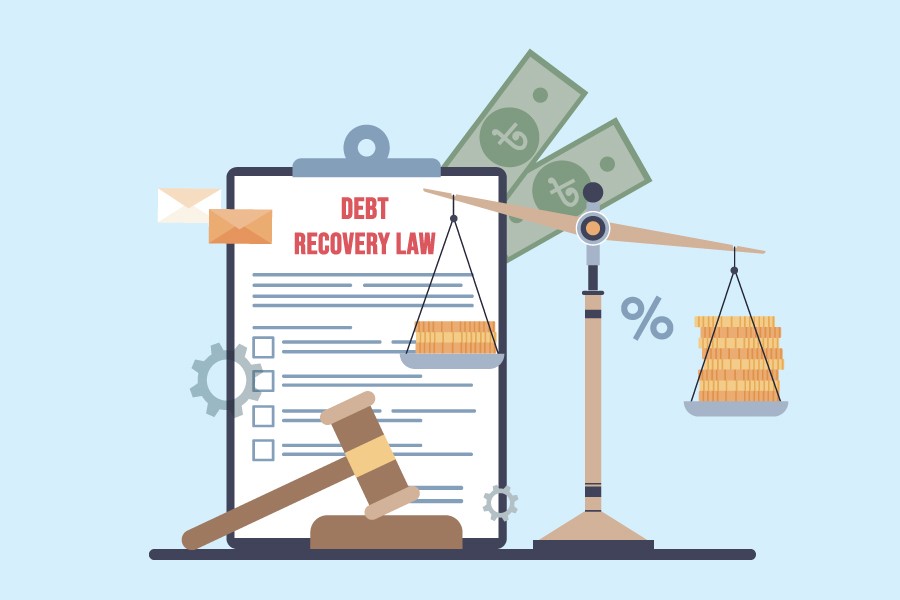Collection of debt seems to be extremely difficult in Bangladesh’s current legal structure. For creditors, it’s a Himalayan task to recover the money from any person or company, be it any bill or friendly lending to a close one. But when it comes to receiving the invoiced amount, the client deemed to pay diligently often ignores the request for payment or at times the creditor’s number is just blacklisted and the debtor is at large.
The amount of money is obviously of certain concern before outstretching the measures of recovering the amount in question legally. Irrespective of the amount, however, is the current modus operandi of recovering debt from individuals or companies sufficient in the country?
The existing law of the land provides the option of money suits for recovery of money for individuals or any business entity such as partnership and/or company. For financial institutions, ‘Artha Rin Adalat Ain 2003’ (Financial Loan Court Act, 2003) provides the civil remedy of recovery. Both money suit and suit under Artha Rin Adalat Ain could be time-consuming while there is no guarantee of recovery of the money. If the borrower provides any cheque, then a criminal case can be filed if the cheque is dishonoured due to any specific reason, in accordance with the provisions of Negotiable Instruments Act, 1881.
It is of paramount importance that, when lending any monetary sum to anyone, documentary evidence is reserved, should there be any dispute between the parties. But alas, it is easier said than done! Most loans are given to borrowers over a friendly cup of coffee or by a handshake agreement disregarding the consequences that may befall, if the borrower fails to repay. Acceptance of oral evidence is less likely to be reckoned by the relevant court. The Evidence Act 1872 does talk about Oral Evidence, but the law is mute on oral transaction regarding the loan.
Practical problems arise with the fact that if it is the case of financial institutions, there are willful defaulters who obtain huge amounts of loan and then stop repaying. Sometimes funds are transferred abroad and the borrowers along with their family also leave the country. In such a situation, a suit under Artha Rin Adalat Ain or a case under Negotiable Instruments Act is only beneficial to the extent that an order for recovery can be obtained against the borrower, but no actual recovery can be made.
As far as personal or a company or partnership’s recovery is concerned, the money suit is time-consuming and the case under Negotiable Instruments Act provides the same result if the borrower/debtor is not found or accepts any punishment rather than willing to pay back debts.
Discussion on the laws of another jurisdiction could shed some light at this point. Recovering debt in the United Kingdom has shown progress in years due to its structure and efficacy. Before recovering debt from any individual, it is a must to consider how much the debt is worth. It is not practical to spend an ample amount of money to recover a debt which does not worth much in amount. But when a creditor loses patience, they would pursue actions which are not even worth the amount to be recovered.
According to the UK former Justice Minister Lord Faulks, “Disputes should be kept away from court and resolved using better, quicker and more efficient ways.”
It’s strongly believed that court proceedings can be time-consuming and may incur costs exceeding the amount in dispute. In the UK, the first step is to solve the dispute amicably between the parties. But when the debtor is reluctant to give any importance to the request of the creditor, a formal letter is sent to the debtor outlining the specifications of the amount loaned in as much detail as practicable so that it leaves a line in the sand with no chamber for falsification.
In case the debtor is a sole trader or individual, Pre Action Protocol for Debt Claims shall be adhered to and in such circumstances, a Letter of Claim to the debtor before proceedings shall be given by the creditor stipulating a timeline for response. UK courts encourage resolution of disputes out of court as much as possible. This is an applaudable approach to avoiding confrontational and time-consuming litigation regarding recovery claims. Also, the Reply Form is formulated in a manner that reduces time consumption.
Nonetheless, if the debtor fails to provide a satisfactory response within the stipulated time, the creditor shall commence proceedings in the relevant court and obtain a judgment against the debtor for enforcement. If the creditor does not commence court proceedings of recovering the debt amount within six years, the debt cannot be enforceable because it shall be ‘statute-barred’. This is a law that makes debt un-recoverable through court actions after a certain period of time.
In Bangladesh, the concept of out of court settlement is not new. Many establishments or individuals do resort to such settlements. However, some tactically opt out for going into settlement out of court so that the trial process runs for year after year, prolonging the process deliberately.
In such circumstances, the legal procedure must be revisited considering all the aspects of practicality such as the duration of suit/case, locating the persons within the duration of suit/case, and further strict punishment. Immediate provision of arrest could be introduced in enacting special law including establishment of debt recovery agencies in a legal framework for the recovery of debts. This is an important issue that needs to be addressed especially for the businesses to run smoothly in the country.
Shahedul Azam and Sadia Sarah are lawyers at the Supreme Court of Bangladesh.


